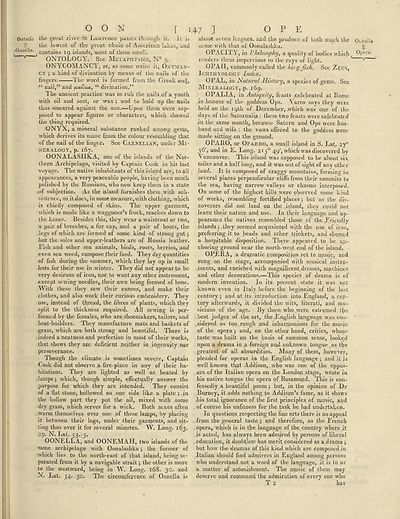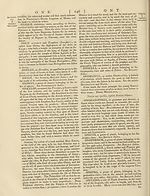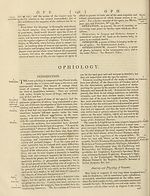Encyclopaedia Britannica > Volume 15, NIC-PAR
(159) Page 147
Download files
Complete book:
Individual page:
Thumbnail gallery: Grid view | List view

f i-47 1 OPE
tfbout seven leagues, anil the moiluce of both much the
O O N
Ontario the great river St Lawrence passes through it. It is
H the lowest of the great chain of American lakes, and
'Qoneila. , contains 19 islands, most of them small.
' ONTOLOGY. See Metaphysics, N° 3.
ONYCOMANCY, or, as some write it, Onyman-
CY ; a kind of divination by means of the nails of the
lingers. The word is formed from the Greek e;y|,
“ nail,” and pxflux, “ divination.”
The ancient practice was to rub the nails .of a youth
with oil and soot, or wax ; and to hold up the nails
thus smeared against the sun.—Upon them were sup¬
posed to appear fig-ures or characters, which showed
the thing required.
:QNYX, a mineral substance ranked among gems,
which derives its name from the colour resembling that
of the nail of the finger. See Carnelian, under Mi¬
neralogy, p. 167.
OONALASHKA, one of the islands of the Nor¬
thern Archipelago, visited by Captain Cook in his last
voyage. The native inhabitants of this island are, to all
appearances, a very peaceable people, having been much
polished by the Russians, who now keep them in a state
f«f subjection. As the pdand furnishes them with sub¬
sistence, so it does, in some measure, with clothing, which
is chietly composed of skins. The upper garment,
which is made like a waggoner’s frock, reaches dowm to
the knees. Besides this, they wear a waistcoat or two,
a pair of breeches, a fur cap, and a pair of boots, the
legs of which are formed of some kind of strong gut}
but the soles and upper-leathers are of Russia leather.
Fish and other sea animals, birds, roots, berries, and
even sea weed, compose their food. They dry quantities
of fish during the summer, which they lay up in small
huts for their use in winter. They did not appear to be
very desirous of iron, nor to want any other instrument,
except sew ing needles,, their own being formed of bone.
With these they sew their canoes, and make their
clothes, and also work their curious embroidery. They
use, instead of thread, the fibres of plants, which they
split to the thickness required. All sewipg is per¬
formed by the females, who are shoemakers, tailors, and
boat-builders. They manufacture mats and baskets of
grass, which are both strong and beautiful. There is
indeed a neatness and perfection in most of their works,
that shows they are deficient neither in ingenuity nor
perseverance.
Though tfie climate is sometimes severe, Captain
Cook did not observe a fire-place in any of their ha¬
bitations. They are lighted as well as heated by
lamps; which, though simple, effectually answer the
purpose for which they are intended. They consist
of a flat stone, hollowed on one side like a plate ; in
the hollow part they put the oil, mixed with some
dry grass, which serves for a wick. Both sexes often
warm themselves over one of these laipps, by placing
it between their legs, under their garments, and sit¬
ting thus over it for several minutes. W. Long. 163.
29. N. Lnt. S3- 5-
OONELLA, and OONEMAH, two islands of the
same archipelago with Oonalashka; the former of
which lies to the north-east of that island, being se¬
parated from it by a navigable strait; the other is more
to the westward, being in W. Long. 168. 30. and
N. Lat. 54. 30. The circumference of Oonella is
same with that of Oonalashka.
OPACITY, in Philosophy, a quality of bodies which
renders them impervious to the rays of light.
OPAH, commonly called the ki/ g fish. See Zeus,
Ichthyology Index.
OPAL, in Natural History, a species of gems. Sec
Mineralogy, p. 169.
OP ALIA, in Antiquity, feasts celebrated at Rome
.in honour of the goddess Ops. Varro says they were
held on the 19th id December, which was one of the
days of the Saturnalia : these two feasts were celebrated
in the same month, because Saturn and Ops were hus¬
band and wife : the vows offered to the goddess were
made sitting on the ground.
OPARO, or Oparro, a small island in S. Lat. 270
36', and in E. Long. 2150 49', which was discovered bv
Vancouver. This island was supposed to be about six
miles and a half long, and it was out of sight of any other
land. It is composed of craggy mountains, forming in
several places perpendicular cliffs from their summits to
the sea, having narrow valleys or chasms interposed.
On some of the highest hills were observed some kind
of works, resembling fortified places; but as the dis¬
coverers did not land on the island, they could not
learn their nature and use. In their language and ap¬
pearance the natives resembled those of the Friendly
islands ; they seemed acquainted with the use of iron,
preferring it to heads and other trinkets, and showed
a hospitable disposition. There appeared to be an¬
choring ground near the north-west end of the island.
OPERA, a dramatic pomposition set to music, and
sung on the stage, accompanied with musical instru-
xnents, and enriched with magnificent dresses, machines
and other decorations.—This species of drama is of
modern invention. In its present state it was not
known even in Italy before the beginning of the last
century ; and at its introduction into England, a cen¬
tury afterwards, it divided the wits, literati, and mu¬
sicians of the age. By those who were esteemed the
best judges of the art, the English language was con-
sidered as too. rough and inharmonious for the music
of the opera; and, on the other hand, critics, whose
taste was built 011 the basis of common sense, looked
upon a drama in a foreign and unknown tongue as tbe
greatest of all absurdities. Many of them, however,
pleaded for operas i» the English language; and it is
well known that Addison, who was one of the oppos-
ers of the Italian opera on the London stage, wrote in
his native tongue the opera of Rosamond. This is con¬
fessedly, a beautiful poem; but, in the opinion of Dr
Burney, it adds nothing to Addison’s fame, as it shows
Jus total ignorance of the first principles of music, and
of course his unfitness for the task he had undertaken.
In questions, respecting the fine arts there is no appeal
from the general taste ; and therefore, as the French
opera, which is in the language of the country where it
is acted, has always been admired by persons of liberal
education, it doubtless has merit considered as a drama ;
but bow the dramas of this kind which are composed in
Italian should find admirers in England among persons
who understand not a word of the language, it is to us
a matter of astonishment. The music of them may
deserve and command the admiration of every one who
T 2 has
Ocneila
11
Opera.
tfbout seven leagues, anil the moiluce of both much the
O O N
Ontario the great river St Lawrence passes through it. It is
H the lowest of the great chain of American lakes, and
'Qoneila. , contains 19 islands, most of them small.
' ONTOLOGY. See Metaphysics, N° 3.
ONYCOMANCY, or, as some write it, Onyman-
CY ; a kind of divination by means of the nails of the
lingers. The word is formed from the Greek e;y|,
“ nail,” and pxflux, “ divination.”
The ancient practice was to rub the nails .of a youth
with oil and soot, or wax ; and to hold up the nails
thus smeared against the sun.—Upon them were sup¬
posed to appear fig-ures or characters, which showed
the thing required.
:QNYX, a mineral substance ranked among gems,
which derives its name from the colour resembling that
of the nail of the finger. See Carnelian, under Mi¬
neralogy, p. 167.
OONALASHKA, one of the islands of the Nor¬
thern Archipelago, visited by Captain Cook in his last
voyage. The native inhabitants of this island are, to all
appearances, a very peaceable people, having been much
polished by the Russians, who now keep them in a state
f«f subjection. As the pdand furnishes them with sub¬
sistence, so it does, in some measure, with clothing, which
is chietly composed of skins. The upper garment,
which is made like a waggoner’s frock, reaches dowm to
the knees. Besides this, they wear a waistcoat or two,
a pair of breeches, a fur cap, and a pair of boots, the
legs of which are formed of some kind of strong gut}
but the soles and upper-leathers are of Russia leather.
Fish and other sea animals, birds, roots, berries, and
even sea weed, compose their food. They dry quantities
of fish during the summer, which they lay up in small
huts for their use in winter. They did not appear to be
very desirous of iron, nor to want any other instrument,
except sew ing needles,, their own being formed of bone.
With these they sew their canoes, and make their
clothes, and also work their curious embroidery. They
use, instead of thread, the fibres of plants, which they
split to the thickness required. All sewipg is per¬
formed by the females, who are shoemakers, tailors, and
boat-builders. They manufacture mats and baskets of
grass, which are both strong and beautiful. There is
indeed a neatness and perfection in most of their works,
that shows they are deficient neither in ingenuity nor
perseverance.
Though tfie climate is sometimes severe, Captain
Cook did not observe a fire-place in any of their ha¬
bitations. They are lighted as well as heated by
lamps; which, though simple, effectually answer the
purpose for which they are intended. They consist
of a flat stone, hollowed on one side like a plate ; in
the hollow part they put the oil, mixed with some
dry grass, which serves for a wick. Both sexes often
warm themselves over one of these laipps, by placing
it between their legs, under their garments, and sit¬
ting thus over it for several minutes. W. Long. 163.
29. N. Lnt. S3- 5-
OONELLA, and OONEMAH, two islands of the
same archipelago with Oonalashka; the former of
which lies to the north-east of that island, being se¬
parated from it by a navigable strait; the other is more
to the westward, being in W. Long. 168. 30. and
N. Lat. 54. 30. The circumference of Oonella is
same with that of Oonalashka.
OPACITY, in Philosophy, a quality of bodies which
renders them impervious to the rays of light.
OPAH, commonly called the ki/ g fish. See Zeus,
Ichthyology Index.
OPAL, in Natural History, a species of gems. Sec
Mineralogy, p. 169.
OP ALIA, in Antiquity, feasts celebrated at Rome
.in honour of the goddess Ops. Varro says they were
held on the 19th id December, which was one of the
days of the Saturnalia : these two feasts were celebrated
in the same month, because Saturn and Ops were hus¬
band and wife : the vows offered to the goddess were
made sitting on the ground.
OPARO, or Oparro, a small island in S. Lat. 270
36', and in E. Long. 2150 49', which was discovered bv
Vancouver. This island was supposed to be about six
miles and a half long, and it was out of sight of any other
land. It is composed of craggy mountains, forming in
several places perpendicular cliffs from their summits to
the sea, having narrow valleys or chasms interposed.
On some of the highest hills were observed some kind
of works, resembling fortified places; but as the dis¬
coverers did not land on the island, they could not
learn their nature and use. In their language and ap¬
pearance the natives resembled those of the Friendly
islands ; they seemed acquainted with the use of iron,
preferring it to heads and other trinkets, and showed
a hospitable disposition. There appeared to be an¬
choring ground near the north-west end of the island.
OPERA, a dramatic pomposition set to music, and
sung on the stage, accompanied with musical instru-
xnents, and enriched with magnificent dresses, machines
and other decorations.—This species of drama is of
modern invention. In its present state it was not
known even in Italy before the beginning of the last
century ; and at its introduction into England, a cen¬
tury afterwards, it divided the wits, literati, and mu¬
sicians of the age. By those who were esteemed the
best judges of the art, the English language was con-
sidered as too. rough and inharmonious for the music
of the opera; and, on the other hand, critics, whose
taste was built 011 the basis of common sense, looked
upon a drama in a foreign and unknown tongue as tbe
greatest of all absurdities. Many of them, however,
pleaded for operas i» the English language; and it is
well known that Addison, who was one of the oppos-
ers of the Italian opera on the London stage, wrote in
his native tongue the opera of Rosamond. This is con¬
fessedly, a beautiful poem; but, in the opinion of Dr
Burney, it adds nothing to Addison’s fame, as it shows
Jus total ignorance of the first principles of music, and
of course his unfitness for the task he had undertaken.
In questions, respecting the fine arts there is no appeal
from the general taste ; and therefore, as the French
opera, which is in the language of the country where it
is acted, has always been admired by persons of liberal
education, it doubtless has merit considered as a drama ;
but bow the dramas of this kind which are composed in
Italian should find admirers in England among persons
who understand not a word of the language, it is to us
a matter of astonishment. The music of them may
deserve and command the admiration of every one who
T 2 has
Ocneila
11
Opera.
Set display mode to:
![]() Universal Viewer |
Universal Viewer | ![]() Mirador |
Large image | Transcription
Mirador |
Large image | Transcription
Images and transcriptions on this page, including medium image downloads, may be used under the Creative Commons Attribution 4.0 International Licence unless otherwise stated. ![]()
| Encyclopaedia Britannica > Encyclopaedia Britannica > Volume 15, NIC-PAR > (159) Page 147 |
|---|
| Permanent URL | https://digital.nls.uk/192583765 |
|---|
| Attribution and copyright: |
|
|---|
| Shelfmark | EB.11 |
|---|---|
| Description | Ten editions of 'Encyclopaedia Britannica', issued from 1768-1903, in 231 volumes. Originally issued in 100 weekly parts (3 volumes) between 1768 and 1771 by publishers: Colin Macfarquhar and Andrew Bell (Edinburgh); editor: William Smellie: engraver: Andrew Bell. Expanded editions in the 19th century featured more volumes and contributions from leading experts in their fields. Managed and published in Edinburgh up to the 9th edition (25 volumes, from 1875-1889); the 10th edition (1902-1903) re-issued the 9th edition, with 11 supplementary volumes. |
|---|---|
| Additional NLS resources: |
|

